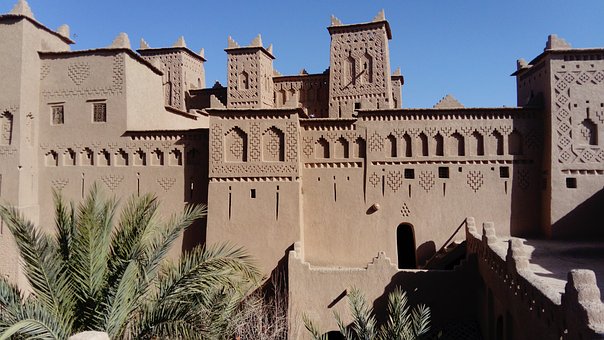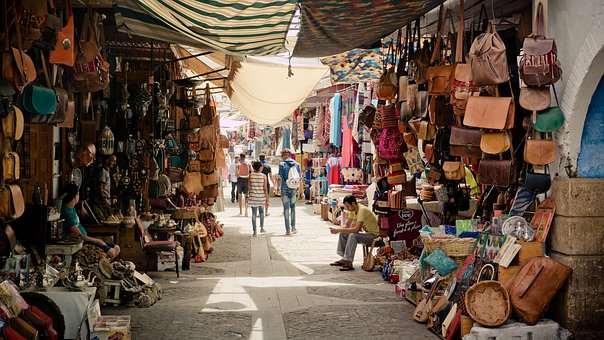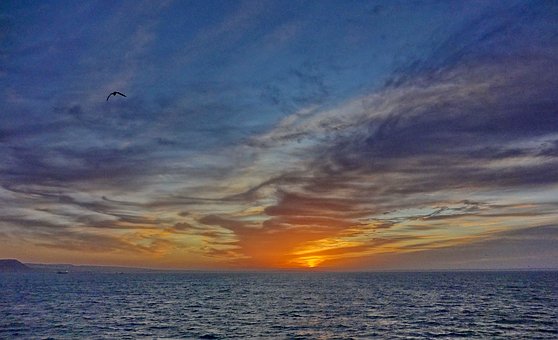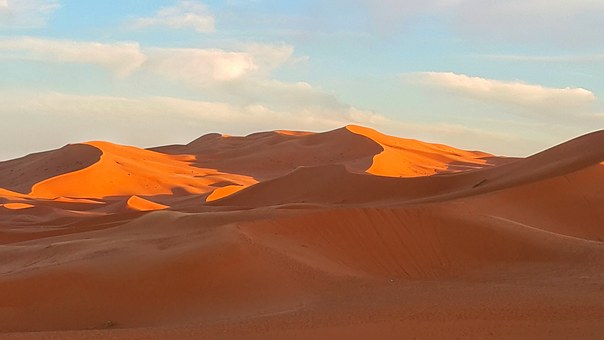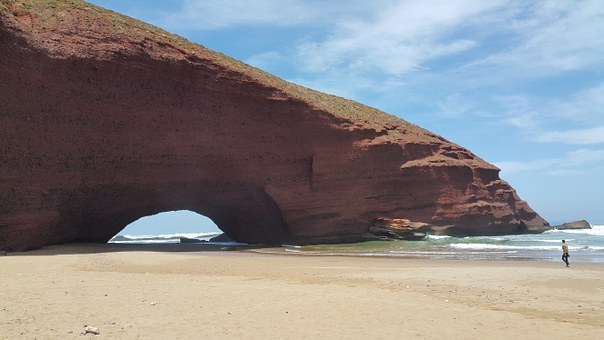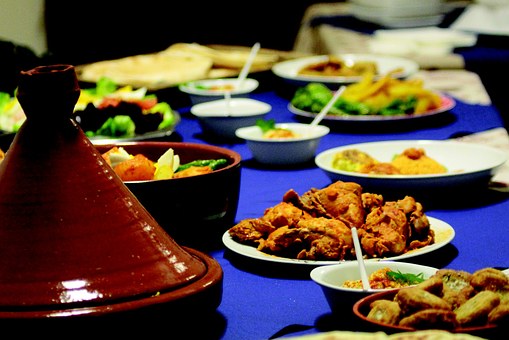Backpacking in Marocco
Travelling in Morocco means immersing yourself in a unique culture and discovering much more than just the tourist destinations. The country presents itself with a unique beauty that is varied. On the one hand, there are the towering Atlas Mountains, green forests and miles of dream beaches. On the other hand, barren deserts and enchanting oases await you as well as cities with a fairytale-like oriental flair.
It is little known that Morocco also has attractive winter sports areas, which have a unique tourist infrastructure and meet Central European standards. Morocco, the kingdom in the northwest of Africa, is bordered by the Mediterranean Sea to the north and the North Atlantic Ocean to the west. In the south there is a border to Western Sahara and in the east to Algeria. From the Mediterranean coast you have a clear, direct view of the European mainland, especially Gibraltar, which is only 14 km away.
Morocco’s infrastructure and especially its transport infrastructure has developed very well, especially in the northwest of the country, so that you as a backpacker can travel the country well by land and air to discover all the interesting and unique features. Unique landscapes and numerous relics from the unique history in connection with the culture result in an expressive fascination. There are nine UNESCO World Heritage Sites to discover, all of which are World Heritage Sites.
The capital and thus the cultural, intellectual and economic centre of Morocco is Rabat, where around 580,000 people live. In contrast to Casablanca with around 3.4 million, Fès with around 1.1 million and Marrakesh with 930,000 people, Rabat with its 34% population density is rather contemplative. Around 35 million people live in the country. During your backpacking tour through Morocco, you will predominantly encounter a Mediterranean-influenced climate.
Desert climate prevails in the extreme south. At higher altitudes, the temperature can drop to freezing point in winter. You can get money at many ATMs with the EC card, if the Mastero sign is attached to them. Otherwise you can conveniently withdraw money with your credit card on your backpacking trip.
The official language in Morocco is Arabic, but it differs from classical Arabic in its dialects. French is spoken as the second official and lingua franca. In the north of the country it also gets along well with Spanish. In some places, such as Agadir, German is even spoken. To satisfy your hunger, you can take advantage of the various food stalls and other catering options that you’ll find everywhere.
Culture in Morocco
The culture of the Moroccans is strongly influenced by the Islamic faith. Therefore it is especially true for women that they dress rather conservatively and closed. Therefore, scarce clothing should not be worn away from the beach. Knees and armpits should always be covered. Due to the heat, long sleeves and wide, airy trousers are recommended. Friends and family in Morocco are welcomed with two kisses on the cheek. This is only true for the same sex.
If you want to express respect and cordiality towards the locals, you can take your right hand after the handshake to your heart or mouth. In shops and cafés, in mixed-gender groups only the man is considered by the staff. Women, on the other hand, play a subordinate role at most. Orders are therefore expected from the man and not from a woman.
Even if the Moroccans disagree about the rule and its king, the public expects a submissive attitude and loyalty to the royal house. Majesty insult is a crime for which you will be put in prison. You should therefore keep any resentments against the royal house or the monarchy for after your trip.
Moroccan culture includes acting. Except in big department stores you can trade and haggle everywhere and especially on the markets in order to get a better price for the desired product. Trading is part of good business. The first mentioned prices of the trader are even designed for you to haggle with him.
More Backpacking Information about Morocco
If you’re used to the cheap prices from Indonesia or Thailand, Morocco doesn’t seem cheap to you. But with a daily budget of 30 to 50 Euros you will make a good living as a backpacker.
In Morocco there are many things to explore and a lot to learn about the culture. Beside dreamlike stalls you will encounter unique desert landscapes and magical oases. The Atlas mountains invite you with its indescribable vegetation to unique hiking experiences. In winter it gets really cold here. You should take this into account when planning your backpacker trip.
There are a variety of overnight accommodations for you. Outside the cities often the price for a room is calculated per person and not per room. If you are looking for a hostel there are even real bargains where you can pay between 6 and 10 Euros for a bed. The average price in hostels is around 13 euros.
The cuisine in Morocco is very varied and offers a variety of different dishes that you should definitely try. They are influenced by the Arabic and Spanish cuisine. Therefore bread and pulses in different forms belong to every meal.
You can simply visit Morocco or get involved with the culture of the country. You will be amazed at how different life is. The big markets in Marrakech, Casablanca, Fès, Rabat and other cities are the most popular places to go shopping, because you can get unbeatable prices here if you haggle with the merchants.
As a German citizen, you don’t have to worry about getting a visa. You can enter Morocco without a visa for 90 days. What else you need to know about Morocco as a backpacker can be found under Visa & Vaccinations.
Backpacker Budget in Marokko
Living and travelling in Morocco is easier than expected, because the North African Kingdom is not only a simple, well developed travel destination, but also, compared to European standards, quite cheap for a backpacker trip. So you can make ends meet with a daily budget of 30 to 50 Euro per day. The local currency in Morocco is the Dirham – short Dh.
When you change money you get about 11 Dirhams for 1 Euro. A simple meal at the many street stalls is already available for 2.30 to 4 euros, where you can enjoy the delicacies of Moroccan cuisine. In a middle-class restaurant you pay around 9 euros for a meal. It gets more expensive in luxury restaurants, where you have to put 45 Euro or more on the table quickly. Moroccan fruit merchants offer you a variety of delicious fruits. A kilo of fruit costs between 0.50 and 0.70 euros.
For a local beer you pay 0.90 Euro for 330 ml. With imported beer it becomes clearly more expensive, so that you pay for 330 ml starting from 2,50. Coffee with milk costs 0,50 Euro and for 500 ml cola you pay 0,50 to 0,60 Euro. Water is particularly favorable, because it belongs to the basic foods.
Taxi driving Bus driving in Morocco
In Morocco it is quite common to fall back on taxis. However, there is a difference between small taxis (petit taxi) for inner-city trips and so-called shared taxis (grand taxi). The shared taxis take you from one city to the next, which is on your itinerary. As the vehicles are old diesel cars, they are not the most comfortable way to get from A to B, but the fastest. In Morocco it is common for taxis to stop just like buses and pick up more passengers until the vehicle is full.
This means that up to 6 passengers are carried. If there are big celebrations, the number of passengers increases to 9. Additionally, three more persons are taken along on a wooden bench in the trunk. The departure points are centrally located near train stations, bus stations or airports. The prices for a trip are usually based on the number of passengers. Payment is made before the start of the journey.
It is worthwhile to act when it comes to the fare, especially if the driver claims that the taximeter is broken. As a guide, you pay around 0.45 euros for a short distance, 0.90 euros for a medium distance and around 1.40 euros for a long distance. If the driver demands significantly higher prices, you should look for another taxi. As an alternative to a taxi, you can also travel by bus. Morocco has a dense bus network, so you can get from A to B quite comfortably.
Bus travel in Morocco
In every town there is actually a bus station where you can get trip tickets on your backpacker. There are direct connections to almost all major cities. The local timetables are exclusively in Arabic. But here you can see readable timetables. In smaller villages there are no timetables. Here you should contact the bus driver directly. It is also quite common for the bus drivers to walk through the buildings and announce their destination. You leave when the bus is full of passengers.
You can choose between the tourist buses with air conditioning and television or the much cheaper, but less comfortable buses. The latter are mostly used by the locals. These busses only drive partly over the usual routes of the tourist busses, but off these routes. Thus you have the possibility to travel cheaply and to experience a quite interesting adventure.
Domestic fares in Morocco
Domestic flights in Morocco can be booked, even with a reduced weekend fare, through the airline Royal Air Maroc. As a rule, the planes do not fly from city to city, but always take the flight route via Casablanca. From there, connecting flights continue to Fès, Quazazate, Al Hoceima and Tangier. There are daily flights to Fès and Casablanca. The airfares are quite expensive, so it is better to use buses or trains for your backpacker trip.
Rail travel in Morocco
By train you can reach all important cities such as Casablanca, Fès, Marrakesh, Meknès, Rabat, Tangier etc. via the well-developed railway network. On most routes, trains run every 60 to 90 minutes. Traveling by train is relatively cheap in Morocco. So you pay for a trip from Tangier to Marrakech about 18 euros in the second class and 27 euros in the first class.
The trains are never as crowded as the buses and need significantly less time for the same route. The Moroccans travelling with you are often very friendly and open-minded, so that you are guaranteed to get further tips for your backpacker trip during the conversation.
Backpacker Routen in Marokko
When travelling in Morocco, as a backpacker you can enjoy a culturally and geographically unique country, which has a lot to offer for adventure seekers, history enthusiasts, surfers and those interested in exchange with other cultures. Trekking enthusiasts, hikers and those who have always wanted to experience a sandy desert will find it worth their while.
You can climb the highest mountain ranges like the High Atlas with 4167 m, the Middle Atlas with 3340 m in the centre of Morocco, the mountain range Jbel Sirwa with 3304 m in the central south or Rif as well as Er Rif with 2456 m on the Moroccan Mediterranean coast. In the mountain regions an indescribable nature awaits you. You’ll find wild olive trees, junipers, cork oaks, argan trees as well as cacti and palm trees.
The long coastal strip invites you to swim, surf and kitesurf. Just as exciting is a trip to the adjacent desert, where you can visit unique oases and get a wonderful starry sky at night. What else should you have seen on your backpacking trip?
Route 1: The classic (15-23 days)
3-4 days exploring Marrakech and visiting the main sights. Pure shopping is the order of the day
3 days desert tour in the Sahara and experience the uniqueness of the landscape.
4 days Essaouria, the most charming place in Morocco and along the beach to Diabat.
2 days exploring Tangier.
3 days to discover Asilah and excursions to Larache and Lixus.
3 days Chefchaouen roam through and the God´s Brigde as well as the waterfall Cascades d’Akchour visit.
2 days Azrou and excursion to Cedre Gouraud and Ifrane.
3 days Fès with excursions to Meknes, Moulay Idriss and the ruined town of Volubilis.
Route 2: Backpacker Intensive Trip (up to 35 days and more)
- 4 days exploring Marrakech and visiting the main sights. Pure shopping is the order of the day
- 3 days desert tour in the Sahara and experience the uniqueness of the landscape.
- 4 days Essaouria, the most charming place in Morocco and along the beach to Diabat.
- 3 days exploring Tangier.
- Discover 4 days of Asilah and go on excursions to Larache and Lixus.
- 4 days Chefchaouen roam through and the God´s Brigde as well as the waterfall Cascades d’Akchour visit.
- 3 days Azrou and excursion to Cedre Gouraud and Ifrane.
- 4 days Fès with excursions to Meknes, Moulay Idriss and the ruins of Volubilis.
- 2 days to explore Rabat, the capital of the country.
- 4 days to visit Casablanca, the economic capital.
- 3 days Safi, beach, water sports and recovery enjoy.
Travel times in Morocco
In principle, it is much warmer in Morocco than in Germany and even warmer than in neighbouring Spain. On the other hand, in winter, especially in the mountain regions, it can get really cold and snow a lot. There is little rain and a lot of sunshine.
When the best travel time for your backpacker trip is can not be answered in general.
Because the climate between North and South Morocco is very different. The most pleasant temperatures are in spring and autumn. It is not quite so hot yet. Basically, Morocco is a great travel destination all year round with the right clothes and equipment.
Backpacker Unterkünfte in Marokko
Apart from the Cîtes d’Etappes in the mountains and some tents in the Sahara, there are many different accommodations, but relatively few hotels with common dorms, as you know them as backpackers from other countries. Instead, there are several hotels in every larger town, including simple accommodation, where you can stay for 4 – 5 Euros. Many renovated riads can be found in Marrakech, for example, where oriental city buildings have been converted into inviting guesthouses in recent years.
There are also hotels where you can find cheap accommodation on your trip if you accept the offer on the roof terrace for sleeping. You will find simple accommodation as well as luxury hotels. In a mid-range hotel, you pay no more than 54 euros per night, while luxury hotels charge from 160 euros for an overnight stay. You can find out what an overnight stay at a hostel in Morocco costs you by visiting the Hostelword website. According to this you pay the following prices for a bed:
- Marrakech 6 -12 Euro
- Fès 7 – 12 Euro
- Chefchaouen 6-8 Euro
- Essaouira 5-6 Euro
- Tangier 10-20 Euro
- Taghazout 38 Euro
- Merzouga 10 Euro
- Agadir 11 Euro
- Assilah 12 Euro
- Discount 15 Euro
In the hostels, the prices sometimes vary considerably, even within the hostel. So you quickly pay double or even triple the price for a double room. Therefore, motels and hotels are certainly an attractive alternative.
Motels on exit roads and motorways
Motels and hotels are an interesting overnight option and offer quite interesting prices. If you don’t necessarily want to spend the night on the roof terrace under the open sky, which is often possible for small money, you can get a room with its own bathroom and internet connection in a middle-class hotel for 53 euros. Hotels are spread all over the city. Most motels can be found at the entrance and exit roads to cities or on motorways.
Riads in the cities
In many cities in Morocco, oriental city buildings have been converted into accommodation where you can find reasonably priced accommodation. Just as interesting are also private accommodations, where there is an own, lockable room. Such offers can be found on the Internet at the relevant providers. You can find numerous riads on the platform Booking.com, where the data of the providers are brought together. A view is worthwhile in any case, because many accommodations with satten discounts on-line their rooms offer. So you find regularly savings offers with discounts of 50 per cent and more.
Backpacker Trips & Tipps in Marokko
When you travel to Morocco, you will encounter a geographical and cultural diversity that will impress you. Unique architecture, seemingly uniforms of policemen and military personnel call for you to pull out your camera and quickly take a souvenir photo. However, there are photographic objects that you should not photograph because they can have bitter consequences.
Therefore you should NEVER photograph police, military buildings, government buildings or any other security relevant, seeming objects in the remotest place. This is forbidden and can even be punished with prison sentences.
Furthermore there are the legendary rip-offs in Morocco, who pretend to be guides and pull the money out of your pocket. They are suddenly there when you stand on a corner and offer their help. Once you’ve reached your destination, the haggling starts because these guides want money for their help. To avoid this scenario, you should always negotiate a fixed price and not accept any help in good faith.
Backpacker Highlights in Morocco
In addition to shopping, there are many exciting adventures that you shouldn’t miss on your backpacking trip through Morocco. A unique highlight is the canyoning at the Ouzoud Falls. Depending on the situation, you’ll have to jump into the depths again and again. This provides a very special adrenalin kick. The unique waterfalls, surrounded by exciting gorges, are located in the northeast of Marrakech and are more than 100 meters high. In the idyllic landscape you will find olive groves and windmills.
Another highlight is camel riding in the desert. At a leisurely pace you experience the vastness and silence when the camel moves over the red sand mountains. At the roadside you pass small oases again and again. Depending on where the route takes you, the massive Atlas Mountains with their unique panorama will rise far in front of you. You will spend the night in a tent camp or a Berber village, where you will immerse yourself deeply in the culture.
Backpacker Insider Tips in Morocco
Backpacking in Morocco you will find wonderful landscapes for hiking in almost every direction. The east offers you dreamlike forests, boulders and plateaus. In the south you’ll cross the Anti-Atlas to the impressive sandy deserts and in the north you’ll find cedar forests and the mountain ranges of the Middle Atlas, where you can hike and climb.
A real insider tip is the small town of Ifrane. With its villas, it radiates a unique European flair that doesn’t fit into its surroundings and seems unreal. Don’t forget to visit the Ifrane National Park, where you can admire the indescribable flora and fauna in the shade of oak and cedar forests.
Even if the south of the country is not yet so well known for hiking, you will experience how the mountains merge into the desert landscape and create an ingenious picture. In the gorges of the Todra Valley you’ll come across nomadic families. From the plateau you have a really great view if you climb up there.
Essen & Trinken in Marokko
The cuisine of Morocco is very different from the one you know from Europe. Meat is very much eaten. Every meal is accompanied by vegetables. The food is typically prepared in a tajine, a clay vessel that is heated over an open fire. This method of preparation ensures that the food is cooked evenly and gently.
Popular ingredients of Moroccan cuisine are potatoes, carrots, chickpeas, meat, courgettes and peas. All your meals are accompanied by bread. If you don’t eat in a restaurant, but dine in a street restaurant or are invited by a local family, you eat with your fingers. The right hand is used for this because the left hand is considered unclean.
Food in Morocco
Morocco is world famous for its excellent cuisine. It is influenced by the Mediterranean and Arabian influences. Thus couscous and tagine, a dish in different variations, belong to the national dishes. Cheap and good food is available in the cookshops of the old towns as well as in restaurants. A lot of meat is served on the table. Due to the Islamic faith you get a lot of chicken, lamb and beef.
Vegetarians also get their money’s worth because of the large variety of vegetables on offer. Classic street food is Moroccan sandwiches, meat skewers, grilled eggplants or flatbread filled with Köfte, which you should definitely try on your backpacker trip. If you need a change of pace, you’ll also find burger stalls and pizzerias in larger towns.
Drinking in Morocco
In Morocco, coffee and tea are often drunk. The country is famous for its unique mint tea, where black tea is brewed with mint leaves. In addition, you get delicious fruit juices. Alcohol is not drunk in public, although there are wine-growing areas in Morocco. In some cities you will also find small alcohol shops, where the locals also shop.
With water you should fall back only on mineral water in bottles and prefer the tap water. It is quite inexpensive and you get it in differently large containers.
Backpacker Visa und Impfungen in Marokko
For your trip through Morocco you do not need a visa. German citizens can enter as tourists up to 90 days without a visa. Nevertheless, you need valid entry documents. The entry regulations according to the Federal Foreign Office are as follows:
- Passport: Yes
- Provisional passport: Yes
- Identity card: No
- Temporary identity card: No
- Passport for children: Yes, with photograph
Annotations
Your travel documents must still be valid for at least half a year!
Medical advice & vaccinations for Morokko
There are no compulsory vaccinations for entering Morocco. However, you should have the standard vaccinations of the Robert Koch Institute up to date. Malaria is hardly known. Diarrhoeal diseases are more likely to occur as a result of food and drinking water hygiene. In the big cities there is in any case a good medical supply.

